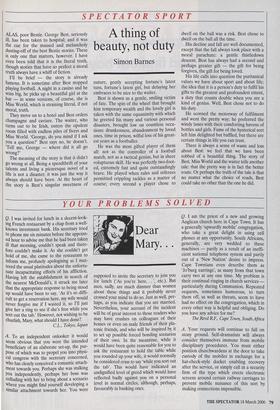SPECTATOR SPORT
A thing of beauty, not duty
Simon Barnes
ALAS, poor Bestie. George Best, seriously ill, has been taken to hospital; and it was the cue for the massed and melancholy dusting-off of the best Bestie stories. There is only one that matters, however. I have even been told that it is the literal truth, though stories that have so perfect a moral truth always have a whiff of fiction. I'll be brief — the story is already famous. It is sometime after Best stopped playing football. A night in a casino and he wins big, he picks up a beautiful girl at the bar — in some versions, of course, she is Miss World, which is straining literal, if not moral, truth.
They move on to a hotel and Best orders champagne and caviare. The waiter, who turns out to be Irish, enters the opulent room filled with endless piles of fivers and Miss World. 'George, do you mind if I ask you a question?' Best says no, he doesn't. `Tell me, George — where did it all go wrong?' The meaning of the story is that it didn't go wrong at all. Being a spendthrift of your talents and living a picaresque novel of a life is not a disaster; it was just the way it always should have been. At the heart of the story is Best's singular sweetness of nature, gently accepting fortune's latest turn, fortune's latest girl, but delaying her embraces to be nice to the waiter.
Best is shown as a gentle, smiling victim of fate. The spin of the wheel that brought him temporary wealth and the lovely girl is taken with the same equanimity with which he greeted his many and various personal disasters, brought low on countless occa- sions: drunkenness, abandonment by loved ones, time in prison, wilful loss of his great- est years as a footballer. He was the most gifted player of them all: not as the controller of a football match, not as a tactical genius, but in sheer voluptuous skill. He was perfectly two-foot- ed, extremely fast and quite outstandingly brave. He played when rules and referees permitted crippling tackles as a matter of course; every second a player chose to dwell on the ball was a risk. Best chose to dwell on the ball all the time His decline and fall are well documented, except that the fall always took place with a moral parachute: a gentle thistledown descent. Best has always had a second and perhaps greater gift — the gift for being forgiven, the gift for being loved.
His life calls into question the puritanical values we have about sport and about life; the idea that it is a person's duty to fulfil his gifts to the greatest and profoundest extent, a duty that counts double when you are a kind of genius. Well, Best chose not to do his duty.
He scorned the motorway of fulfilment and went the pretty way; he preferred the windy lanes with their comforting havens of bottles and girls. Fame of the hysterical sort left him delighted but baffled, but there are certain things in life you can trust.
There is always a sense of waste and loss about Best: we feel that we have been robbed of a beautiful thing. The story of Best, Miss World and the waiter tells another tale: that the pretty way is in fact the better route. Or perhaps the truth of the tale is that no matter what the choice of roads, Best could take no other than the one he did.


















































































 Previous page
Previous page